Spring 2016 Newsletter
- Director's Welcome
- Clinical Staff Updates
- Featured Articles
- Student Articles
Director's Welcome
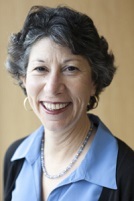 By Marsha Mansfield, Clinical Professor of Law; Director, Economic Justice Institute
By Marsha Mansfield, Clinical Professor of Law; Director, Economic Justice Institute
As we draw close to the end of another school year, I, as always, reflect back on the ways that our clinics make a difference in our community. Some impacts are “big.” The Immigrant Justice Clinic led a community dialogue about Ferguson and the issues of race and disparity. The Mediation Clinic co-led a “diversity dialogue” that was chronicled in the last EJI, Ink newsletter. The NLC and CLC are vigorous participants in the legislative process, testifying for and against legislation that impacts Wisconsin’s consumers, renters, and families.
However, many of our clinics’ efforts are directed towards saving one tenant’s security deposit, or remedying one consumer’s wrongful debt, or facilitating one child’s ability to stay in the United States, or one parent’s efforts to escape domestic violence and protect her family. These individual efforts may not garner the widespread press that often attends “big” events, but they are critical to protecting the safety and economic security of our community. For those individuals and families who can stay in their apartment because of NLC’s efforts, or who can support their families because they are getting child support as result of FCC representation, or who are not living in fear of deportation because IJC was able to cancel a removal proceeding, justice has been accessed and obtained.
We tell our students at the start of every summer about EJI’s educational mission: to provide our students with a significant learning experience in which they develop into skilled legal professionals and engaged public citizens. Through their participation in each of our clinics, they learn how necessary their work is to “improving the lot of others” as they strive to find justice for their clients.
At EJI we endeavor to provide our students with the essential competencies needed to become effective lawyers while instilling in them a deep appreciation and understanding of the multitude of challenges that people face in these changing times as well as the courage to address disparities. Your support is critical to our work. Your contributions can make a difference in the number of students we can serve and the number of programs we can offer. We have an easy way to donate on-line. Please visit our website at and consider making a gift. We hope you enjoy EJI Ink.
Clinical Staff Updates
Mitch had a very busy start to his year. In January, he presented a CLE to Small Claims Assistance Program Volunteers at the Dane County Courthouse along with Sarah Orr. In February, Mitch was promoted to Clinical Associate Professor and traveled to Yale Law School to give a presentation on Sliding-Scale Law Firms at the RebLaw Conference. In March, he was appointed to the Wisconsin Access to Justice Commission by Dean Raymond and, in April, he presented at the Access to Justice 3 conference at the University of Missouri Kansas City School of Law. The Neighborhood Law Clinic also won an honorable mention for the CLEA Award for Excellence in a Public Interest Case Project.
In January Marsha Mansfield made two CLE presentations. The first, “Ethical Responsibilities of Providing Legal Assistance through Limited Representation and Drafting Pleadings on Behalf of Pro Se Litigants,” was made at Ethics and the Non-Traditional Lawyer Relationship: Clients and Opposing Parties with Impairment or Diminished Capacity, Limited Scope of Representation and Unrepresented Parties co-sponsored by Disability Rights Wisconsin, Inc. and The Legal Aid Society of Milwaukee, Inc., on January 7, 2016. She also presented about Limited Scope Representation at the Law School’s Ethics CLE in January.
Stacy Taeuber also had a busy semester. Last August she was appointed to serve a four-year term on the Wisconsin Advisory Committee to the U.S. Commission on Civil Rights.
In October, she made a presentation to students and faculty at a UW-Madison International Learning Community (ILC) Roundtable Dinner. In February, Stacy and two IJC students gave the kickoff talk, “Immigration and the Wisconsin Idea” for the Wisconsin Foundation and Alumni Association’s UW Showcase series, which brings local alumni and donors together to hear about innovative research and learning on the UW-Madison campus. IJC also participated as amicus in two cases before the Wisconsin Supreme Court: State v. Shata, which involved the duty of defense counsel to advise noncitizen clients of the immigration consequences of conviction; and State v. Salas-Gayton, which addressed whether a court may consider a defendant’s immigration status as a factor at sentencing. Stacy presented oral argument in State v. Shata. She also participated on a panel in April at the DePaul University College of Law Journal for Social Justice symposium. Stacy also had many appearances in local media in recent months to discuss issues such as, Governor Walker’s announcement that Wisconsin would refuse to accept any Syrian refugees for resettlement, proposed legislation outlawing so-called “sanctuary cities” in Wisconsin, and the plight of undocumented workers on Wisconsin’s dairy farms (in the aftermath of the large “Day Without Latinos” protest).
Consumer Law Clinic
A Capstone Case in the Consumer Law Clinic
By Molly Malloy, (2L)
About halfway through our summer at the clinic, “Patrick” (not his real name) contacted us for help. Patrick is a sharp, responsive, proactive person who was working hard to get his finances in order after filing for bankruptcy in 2011. Thinking that he had things back on track and could handle his bills on his own, Patrick dismissed the bankruptcy action before completing the repayment plan approved by the bankruptcy judge. Unfortunately, an old pre-bankruptcy payday loan judgment resurfaced just before the statute of limitations to sue on the loan ran out. A local debt-collection law firm secured a garnishment order allowing it to pull large amounts of money directly from Patrick’s biweekly wages to pay the judgment.
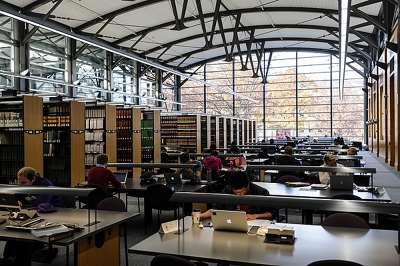 Eager to help, the CLC and Patrick signed a client agreement. The judgment amount had grown significantly with five years of interest. Like many individuals we encounter in the clinic, Patrick wanted to pay off the judgment but also wanted to make sure that the amount was correct and to set up a payment plan that would not cause him to default on other obligations. Robb Evans and I dove into researching wage garnishment, focusing on garnishment to collect payday loan debt. Patrick’s court date was coming up, and we needed to know how we could help him.
Eager to help, the CLC and Patrick signed a client agreement. The judgment amount had grown significantly with five years of interest. Like many individuals we encounter in the clinic, Patrick wanted to pay off the judgment but also wanted to make sure that the amount was correct and to set up a payment plan that would not cause him to default on other obligations. Robb Evans and I dove into researching wage garnishment, focusing on garnishment to collect payday loan debt. Patrick’s court date was coming up, and we needed to know how we could help him.
In many ways, Patrick and his case came to represent the summer clinic experience to us—with all its frustrations and its triumphs. After some research, Robb and I were very excited to find a Wisconsin statute that expressly prohibits wage garnishment to collect payday loans. Presumably, the policy behind the statute was that the high-interest, short-term loans are predatory in nature, with interest rates and conditions that no one with any other option would accept. Payday loans target individuals in financial distress and, most often, plunge them deeper into insurmountable debt. The statute, therefore, provides that no one will be in a position of sacrificing necessities to pay off a payday loan through wage garnishment. We were ready to write a Motion to Dismiss, characterizing the garnishment in Patrick’s case as illegal under the statute.
In hindsight, Patrick’s case became an exercise both in double-checking the statute and in dealing with disappointment. Our excitement came to a screeching halt when we discovered that the anti-garnishment statute had taken effect just months after Patrick borrowed the money. The law did not apply to his loan. However, with a hearing de novo fast approaching, we pressed on to help Patrick achieve the best possible outcome under the law and circumstances. Specifically, he was interested in spreading the payments out over a longer period so that the total amount paid would be the same, but the garnishment wouldn’t interfere with his ability to pay his mortgage and support his teenaged son. Unfortunately, the collection law firm wouldn’t even consider the arrangement. We knew that it would be up to the judge to decide how the garnishment would proceed.
Robb and I appeared in court alongside our supervising attorney, Sarah Orr, to present Patrick’s request to the judge. Patrick testified about his work and his expenses, and how he wanted to pay but just needed to spread the payments out to prevent hardship. The judge determined that Patrick’s position was very reasonable and granted the request for lower payments over a longer time-frame.
Although it wasn’t the dismissal we imagined when we found the anti-garnishment statute, it very much felt like a victory. It summed up our role in the clinic: to step in to help people who wouldn’t otherwise have legal representation. The small adjustments to the repayment plan ordered by the judge made a big difference to Patrick, and we were able to help make it happen. Seeing Patrick’s happiness and relief after the hearing was a great reminder that the triumphs in the clinic far outweigh the frustrations.
Family Court Clinic
Using Family Law to Obtain Immigration Relief for Minors
Over the past few years, the numbers of unaccompanied minors traveling to the United States has continued to swell. Many flee their homes due to violence associated with drug trafficking, severe abuse, abandonment, exploitation, or deep deprivation. The Division of Children’s Services (DCS) provides care and placement for children who come into the United States from other countries without an adult guardian. These children are referred to as "unaccompanied alien children" (UAC) in the statutes. They are typically placed in detention centers near the border. Some have relatives in the U.S. who are willing to be sponsors and who facilitate the children’s travel to the relative’s state of residence.
Many of these children are eligible for Special Immigrant Juvenile Status, a form of federal immigration relief available to unaccompanied immigrant children who are under 21, unmarried, under the jurisdiction of a juvenile court, and who, for reasons of abuse, abandonment, or neglect, cannot be reunified with one or both of their parents in their country of nationality. However, before relief can be sought in immigration court, an order must be obtained in a juvenile court (which includes family court) with the necessary findings made regarding the inability of the child to be reunified with one or both parents because of abuse, abandonment, or neglect.
The juvenile court’s role in the federal immigration process is limited to making very specific factual findings concerning the child. The juvenile court does not make any decisions about the child’s entitlement to Special Immigrant Juvenile Status or to any immigration benefits. Rather, the juvenile court’s findings are simply a prerequisite to the child’s filing of the I-360 Petition for Immigrant Juvenile Status.
The juvenile court order is the basis of a unique collaboration between the Family Court Clinic (FCC) and the Immigrant Justice Clinic (IJC). The students in the FCC handle the family court proceedings and the IJC students handle the preparation and filing of the I-360 Petition. To date, the FCC students have filed guardianship cases, custody & placement actions, and divorces, where they have presented the necessary facts to substantiate the findings regarding reunification that are described above.
These cases are often challenging, both emotionally and procedurally. The children may have been subjected to abuse at the hands of gang members or family members, or have been abandoned by parents who, perhaps for laudable reasons, feel that their child’s chances of staying in the U.S., are improved by their absence. Whatever the reason, the FCC and IJC students must engage in an in-depth interview of the child(ren) so that the necessary facts can be established that form the basis of the I-360 Petition. Furthermore, many of the children are not English speakers, and the students must rely upon interpreters to assist them to effectively communicate with their clients.
Students from the two clinics work closely together, each learning something about the other’s area of law as they develop a way to help the clients, as each person’s circumstances are so different. The FCC students must first determine if a family court matter can be filed in a court that could make the requisite findings. They research various family and juvenile actions before making a decision regarding the type of case to file. Then, they file the necessary paperwork in family court and educate the family court judge through written briefs as to the reason they are asking for specific findings in the family court or guardianship matter. Finally, they appear in court and make their argument in support of the relief requested.
The FCC has been successfully in several cases and currently the students are working on two family cases and one guardianship where SIJS is involved. These opportunities allow students in the clinics to learn, to collaborate, and to obtain success for a very vulnerable population. Best of all, however, are the smiles on the faces of our clients or the children when the students have obtained the findings that will allow the children to petition for legal status in the United States.
Immigrant Justice Clinic
IJC Students Volunteer at South Texas Family Residential Center
In January, five IJC students travelled to Dilley, Texas, to volunteer full time for a week with the CARA/AILA Pro Bono Family Detention Project. The CARA Project brings volunteer lawyers and law students to Texas to provide desperately needed legal services to detained mothers and children from Central America. The U.S. government has continued its policy of detaining the women and children at the border while they determine whether the women qualify to seek asylum in the U.S. The facility in Dilley, Texas is in a remote rural area with no ready access to legal services.
IJC students had the opportunity to help vulnerable mothers and children while also learning practical legal skills. They prepared mothers for the “credible fear” screening interviews with immigration officials, learning what had caused the women to take their kids and flee, and helping the women understand how to present their claims to the immigration officials. The students heard the stories of mothers who were targeted by gangs, whose children faced forcible recruitment into the gangs, and who were victims of domestic violence in their home countries of Honduras, Guatemala, and El Salvador. Students assisted mothers in gathering the necessary documents to request bond, represented women in hearings before an immigration judge, and counseled mothers being released from custody. 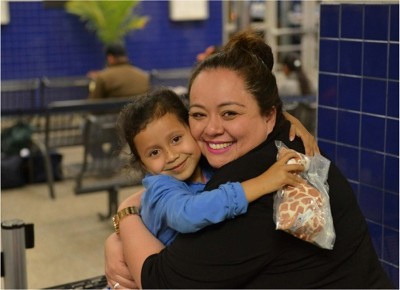
Some of the women and children the students worked with had been picked up by Immigration and Customs Enforcement (ICE) in raids that targeted women who had previously been released but had since been ordered deported. Their stories were particularly heartbreaking because they were taken from their homes early in the morning with no warning. The children drew pictures of what it was like to be woken up by ICE officers and removed from their homes when they were expecting to wake up and go to school.
Law students took declarations from newly arrived mothers and children detailing their experiences in the short-term border detention facilities known as “ice box” (hielera) and the “dog kennel” (perrera). One student recalled how during one interview with a mother and her 14-year-old son, the boy repeatedly broke down crying as he described what they were put through – he had been separated from his mother, kept in a crowded, freezing holding cell, while his mother suffered in a different cell, not knowing what was happening to her son. Seeing women and children who had already suffered so much in their home countries and on the journey north be subjected to even more trauma was a difficult and eye-opening experience. The students all returned home having gained so much in their legal and personal development.
IJC Launches Street Law Pilot Project at East High School
“Street Law programs help advance justice by empowering people with the legal and civic knowledge, skills, and confidence to bring about positive change for themselves and others.”
www.streetlaw.org
The University of Wisconsin Law School Immigrant Justice Clinic is piloting a Street Law Project this semester at East High School. Over the course of six Mondays, five UW law students and two attorneys are spending time with around a dozen high school students from East High School’s Latino Youth Group. Using dynamic and interactive methods such as skits, role-plays, and creative writing, law students teach the high school students about their legal rights and responsibilities in various situations. With the support of the law students, the high school students will then develop their own “know your rights” presentation that they can give to a variety of audiences, both at schools and to the broader community. The high school students are encouraged to take ownership of the project, gain confidence in their knowledge, and be creative in finding ways to engage audiences.
IJC student Amanda Postel and UW Law grad (and former IJC student) Jared Prado, under the supervision of IJC director Stacy Taeuber, spearheaded the Street Law Project. Amanda and Jared established a connection with Centro Hispano of Dane County, which already has programs in Madison schools, and as a result IJC was invited to pilot a project at East High School. Amanda and Jared have taken primary responsibility for developing the curriculum, while IJC students Jessica Slind, Molly Cohen, and Courtney Nussbaumer, along with 1L Ryan Gladych, join the group on Mondays to work with the high school students.
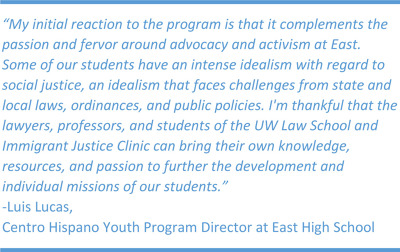 The concept of “Street Law” grew out of a program started by the Georgetown University Law Center in the early 1970s that sent law students out into the community to teach practical law to high school students. Today, Street Law, Inc., exists as a separate entity and fosters programs all over the world. IJC drew much of the inspiration for this project from these and other existing Street Law programs. Street Law empowers young people to become active, engaged members of their communities. The East High students participating in the program will gain practical knowledge about the law and about their rights and responsibilities as members of society. They will also learn to become educators themselves. Throughout the process, and with the law students’ mentorship, they will gain confidence, inspiration, and the motivation to succeed.
The concept of “Street Law” grew out of a program started by the Georgetown University Law Center in the early 1970s that sent law students out into the community to teach practical law to high school students. Today, Street Law, Inc., exists as a separate entity and fosters programs all over the world. IJC drew much of the inspiration for this project from these and other existing Street Law programs. Street Law empowers young people to become active, engaged members of their communities. The East High students participating in the program will gain practical knowledge about the law and about their rights and responsibilities as members of society. They will also learn to become educators themselves. Throughout the process, and with the law students’ mentorship, they will gain confidence, inspiration, and the motivation to succeed.
The reaction so far has been positive from all involved and we hope that the program will continue at East and eventually expand to other Madison high schools as well.
Mediation Clinic
Mediation Clinic Participates in Emerging Issues Conference
By Eric Martin (2L)
The EJI Mediation Clinic recently participated in the statewide Wisconsin Association of Mediators Emerging Issues Conference. On the first day of the conference, Mediation Clinic Director Perri Mayes, co-presented a session on the topic of safety and security in mediation practice. On the second day, the Clinic’s student-mediators also attended, giving them the opportunity to learn about current issues in the mediation field and to interact with practicing mediators. Student-mediators were also involved by assisting with tasks at the conference.
Student-mediators heard three speakers who addressed a variety of topics including developments in the field, ethics, and mediation techniques. There was also a lively debate regarding a proposed Wisconsin Supreme Court Rule that would allow attorney-mediators to draft divorce settlements during family law mediations.
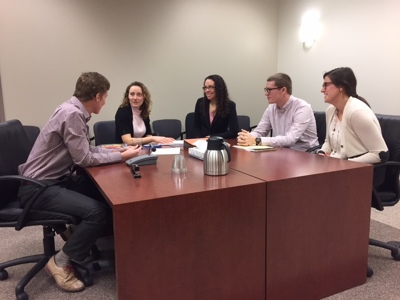 The opening speaker was Dr. Ken Waldron, a mediator who focused on the psychological aspects of disputing parties during mediation. His presentation on Game Theory highlighted, contrary to a common belief among disputing parties, how mediation is not a zero sum game and how working together achieves greater returns among the participants.
The opening speaker was Dr. Ken Waldron, a mediator who focused on the psychological aspects of disputing parties during mediation. His presentation on Game Theory highlighted, contrary to a common belief among disputing parties, how mediation is not a zero sum game and how working together achieves greater returns among the participants.
Waldron then discussed tactics to help achieve a more collaborative mediation. Tactics include breaking down multiple goals into single ones to make them manageable and keeping in mind the subjective goals of the parties, not only the objective ones.
In the next presentation, Michael Rust, Executive Director of the Winnebago Conflict Resolution Center, Inc., spoke about ethics for mediators. He discussed statutory law, professional codes of conduct, and ethical guidelines for mediators. He also talked about how technological advances and use of social media affect practices and ethical considerations.
The conference concluded with the Honorable Michael Dwyer from Milwaukee County, who serves as Chair of a Wisconsin Supreme Court Planning and Policy Advisory Committee (PPAC) sub-committee which is crafting a rule proposal relevant to mediation practice. He introduced the draft rule proposal to conference participants. The proposed rule would enable attorney-mediators to draft divorce settlement documents using standard forms in addition to writing mediated agreements for parties.
The proposal garnered mixed reactions from the mediators in attendance. Proponents argue that it will increase efficiency during family law mediations and help streamline and complete the legal divorce process for unrepresented parties. Opponents argue that since the rule would only apply to attorney-mediators, it would be harmful to the practices of mediators who are not attorneys. This group makes up a large percentage of the mediators in Wisconsin. It is also thought that having the rule in place may lead to less of a party-driven process in many cases, and would not ensure that mediators have the knowledge base to assist parties in the manner contemplated by the rule.
The proposed rule has been unanimously approved by the State Bar Ethics Committee. The next step is to have the proposal heard and discussed by the Planning and Policy Advisory Committee (PPAC). If approved by the PPAC, it will petition the Wisconsin Supreme Court to decide whether it should be enacted.
The Clinic’s student-mediators’ ability to understand and observe part of the process for enacting a new Supreme Court Rule was quite valuable. The student-mediators were also able to interact with advocates for and against the proposed rule change, providing a knowledgeable foundation for the student-mediators to understand and spread awareness about the proposed rule.
Throughout the conference, the student-mediators' interactions with the professional mediators offered opportunities for networking and informal conversations about having a mediation practice. All in all, the conference was an educational and beneficial experience.
Neighborhood Law Clinic
Neighborhood Law Clinic Celebrates 1-Year Anniversary of the UW-South Madison Partnership Office
by Kathryn Pfefferle (2L)
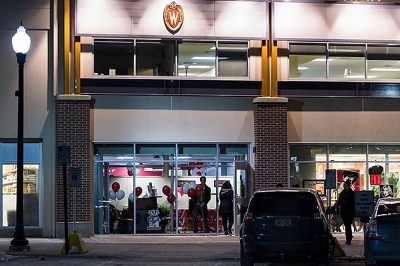 Most readers know that the Neighborhood Law Clinic (NLC) has long held office space at the Villager Mall on the south side of Madison. Over the past 20 years, the clinic has occupied many different locations within the facility. Just a year ago, in January 2015, the NLC moved into a new location at the mall, no longer deep inside the mall, but right out front, with a large window clearly visible from the neighborhood. But the best part of this move was that the NLC is now in a multi-purpose space with other University of Wisconsin programs that also serve the community. Along with dozens of community members, as well as administrators and staff from the various UW programs, I spoke about how what the NLC is and what the new space means for us, the UW, and the community at the UW-South Madison Partnership Anniversary Celebration. Here is a synopsis of my remarks:
Most readers know that the Neighborhood Law Clinic (NLC) has long held office space at the Villager Mall on the south side of Madison. Over the past 20 years, the clinic has occupied many different locations within the facility. Just a year ago, in January 2015, the NLC moved into a new location at the mall, no longer deep inside the mall, but right out front, with a large window clearly visible from the neighborhood. But the best part of this move was that the NLC is now in a multi-purpose space with other University of Wisconsin programs that also serve the community. Along with dozens of community members, as well as administrators and staff from the various UW programs, I spoke about how what the NLC is and what the new space means for us, the UW, and the community at the UW-South Madison Partnership Anniversary Celebration. Here is a synopsis of my remarks:
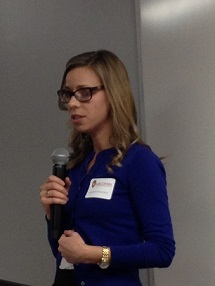 I’m a clinical law student with the Neighborhood Law Clinic. For those who aren’t familiar – the NLC provides litigation services in the areas of Landlord-Tenant and Employment law. Our service mission is to provide a broad range of legal and advocacy services to low-income people in the communities surrounding the Law School. The UW South Madison Partnership office space has enabled our clinic to operate within the community we serve and presented opportunities for us students to participate in community events and others services.
I’m a clinical law student with the Neighborhood Law Clinic. For those who aren’t familiar – the NLC provides litigation services in the areas of Landlord-Tenant and Employment law. Our service mission is to provide a broad range of legal and advocacy services to low-income people in the communities surrounding the Law School. The UW South Madison Partnership office space has enabled our clinic to operate within the community we serve and presented opportunities for us students to participate in community events and others services.
By sharing this space, we see cross-pollination from other programs – which further helps us students feel more connected and aware of what is available in the community, and enables us to provide our services better. Moreover, our clients see that the UW is committed to the community, offering programs that educate and engage, in addition to addressing legal needs.
Equal access to justice is a fundamental concept of our justice system but yet there is no constitutional right to counsel in the civil court system. If you cannot afford an attorney, you are not assigned one, as in criminal court. You go unrepresented. And sadly, for most people living with in poverty, that is exactly what happens.
The UW South Madison Partnership is not going to solve all the issues of poverty, but it has enabled us to make a difference for many members of the community. For example, in the last 10 months that I have been a student in the program - I've meet with dozens of people and taken on many new cases for clients that would otherwise lack meaningful access to justice. And collectively, in the last 10 months our students have put in more than 600 hours of service at our new shared office. Listening to community members, providing information, and when we can, representing them in court. This has been a meaningful and worthwhile experience for all involved.
The Neighborhood Law Clinic's Rebellious Trip to Yale
By Sophie Crispin (2L)
In 1992, Gerald Lopez wrote a seminal work about the challenges of radical social justice lawyering entitled, “Rebellious Lawyering.” It is required reading for Neighborhood Law Clinic Students every summer, and the issues that the book addresses form the basis for numerous discussions throughout students’ year in clinic. The book lead to the creation of an annual conference called RebLaw, held at Yale Law School every February. This past fall, fellow NLC student, Kate Hanson and I submitted a proposal for a presentation at RebLaw that was accepted! Our initial excitement was tempered somewhat by the fact that “acceptance” meant we needed to do a lot more work to organize a panel of speakers over finals and winter break, and then travel to chilly Connecticut in February.
Entitled, “[Not] Waiting for Gideon: Innovative Approaches to Expanding Access to Civil Justice¸” the panel was a hit at the conference, with attendees filling every chair and more standing to hear from the experiences of the panelists. Those panelists were Beth Mellen Harrison who works as a Supervising Attorney in the Housing Law Unit at the Legal Aid Society of the District of Columbia, and the NLC’s very own Mitch. Beth discussed how her organization is working to fulfill the dream of providing free civil counsel to clients in housing cases, and Mitch explained how sliding scale non-profits like Community Justice Incorporated in Madison are expanding access to justice by providing services to clients who do not qualify for, or cannot obtain free legal aid or afford a market-rate attorney.
Reflecting on the conference experience, I have come to recognize that rebellious lawyering is really difficult and arguably the most important thing one can do with the privilege that a law school education provides. I also noticed that Yale is an exceptionally wealthy school and community. The campus had gates everywhere. Those gates, which served to exclude the poor and the uneducated, stood in stark contrast to the conference which is all about breaking down barriers and increasing access. I also noticed a larger police presence in New Haven, Connecticut than in New York City, where we had to fly into in order to get to the conference. The dissonance left me pondering whether it made sense to host a Rebellious Lawyering conference in an exclusive community that is expensive to travel to. Maybe the next proposal we submit to the RebLaw organizers will be to move the conference to a more accessible location. Now, that would be radical.
